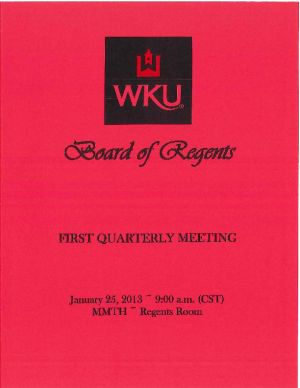Regents Notebook: Beginning-of-year updates bring Regents up to speed

January 25, 2013
Although the approval of football head coach Bobby Petrino’s contract dominated the discussion around Friday’s Board of Regents meeting, a number of action items and updates were also on the agenda.
The first quarterly meeting, which was delayed more than two hours because of icy conditions, featured updates regarding enrollment, construction and legislative priorities.
Three regents were absent, but a quorum was present, allowing for voting on action items on the agenda.
January term enrollment up
Brian Meredith, associate vice president for Enrollment Management, said enrollment in January term classes has increased since last year, which is pleasing.
According to a document provided at the meeting, 2,062 students took a January term class this year, up an overall total of 15 students from 2012. These numbers show that 35 more undergraduate students took a class, while 20 fewer graduate students enrolled in a winter class.
Meredith said the numbers for the spring semester are not ready yet, but currently stands at about 18,700, which is a typical number. Because this week was the first week of classes, the number of students enrolled in dual credit, Navitas and second spring bi-term courses could still increase.
“Spring enrollment is up and down by the minute,” Meredith said.
Dual Credit Program continues expansion
Dual credit classes, where area high school students can earn college credit while still in high school, is adding more and more students and course offerings as the program grows.
Operated by the Division of Extended Learning and Outreach, dual credit classes are offered at 32 high schools in 23 Kentucky counties.
Laura Ricke, director of Academic Outreach for DELO, told Regents that online dual credit enrollment is growing tremendously, as is the demand for agricultural course offerings.
Dewayne Neeley, program coordinator for dual credit, said the program currently has a partnership with every college at WKU.
Current courses offered include five different languages, chemistry, astronomy, psychology and sociology.
“It’s increasingly broad, and that number grows all the time,” Ricke said of course offerings.
Last fall, WKU and Barren County High School kicked off a 19-hour agricultural dual credit program.
Gordon Emslie, provost and vice president for Academic Affairs, said the program is sequential and is designed to flow seamlessly into an agriculture major at WKU.
WKU monitors legislative priorities
A bill that would allow Kentucky universities to issue agency bonds to fund campus improvement projects with university funds could go before the Kentucky legislature as soon as Feb. 5, Robbin Taylor, vice president for Public Affairs, said.
A combined 11 projects at six Kentucky public universities — including the Honors College and International Center at WKU — would get the go-ahead if this plan is approved.
Taylor emphasized that this would be a university-funded project with no money coming from the state. However, the state does have to allow public institutions to take on this debt, she said.
Because this year’s assembly is not a budget year, the measure must pass with two-thirds in the state House of Representatives and state Senate.
In a letter to Gov. Steve Beshear and the Kentucky General Assembly, eight university presidents — including the presidents of Eastern Kentucky University and Kentucky State University, which do not have proposals under this plan — said these capital investments are crucial.
“These projects are no longer on a want list; they are on a need list,” the letter said.
According to a capital investment economic impact summary, WKU’s Honors College building would cost $22 million and impact about 1,200 students at WKU.
Together the 11 projects would cost more than $388 million and impact about 102,773 students at the six universities.












